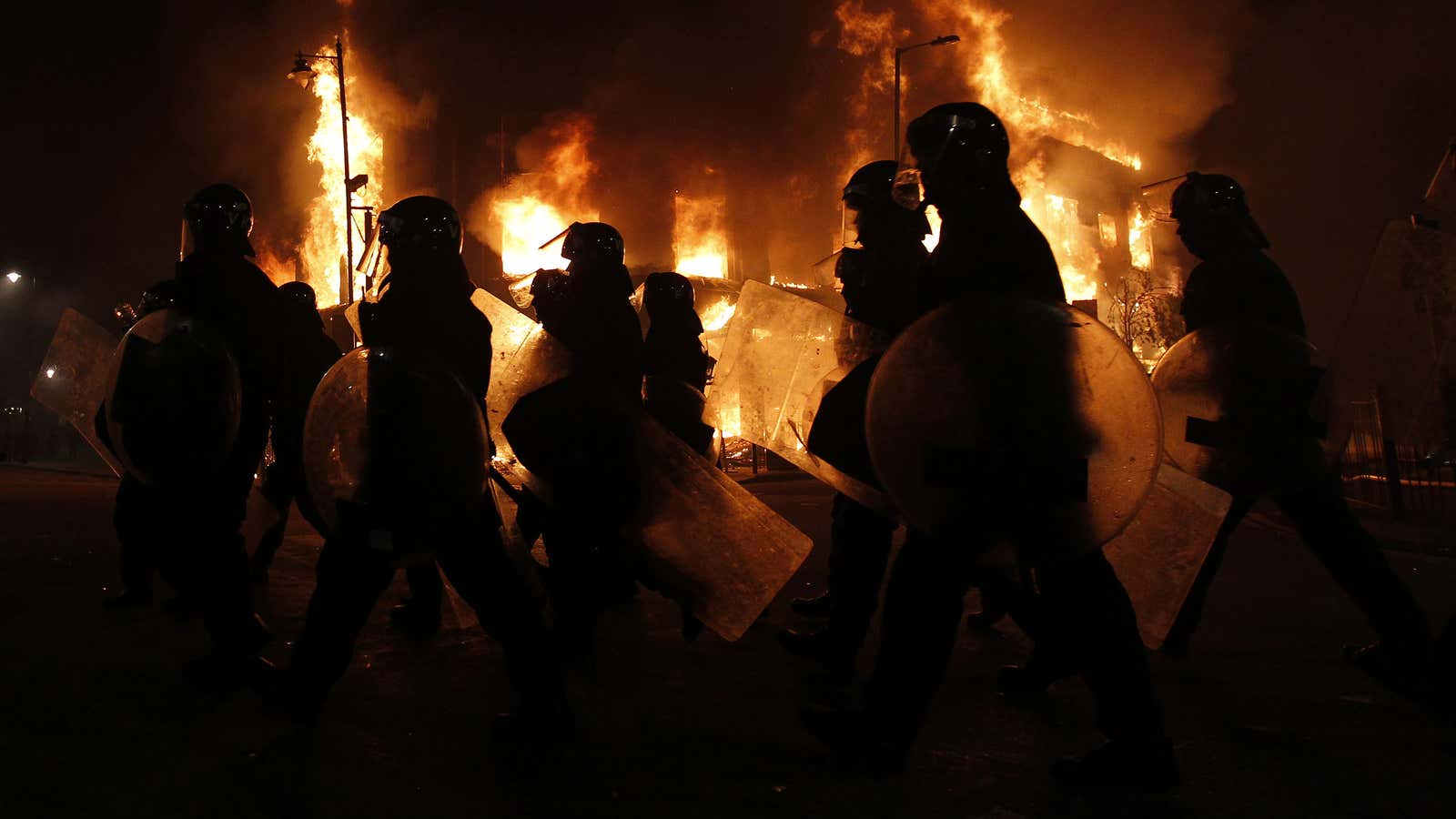My London neighborhood, Tottenham, went up in flames after a police shooting in 2011. There was a protest outside the police station, which ended peacefully. Then someone set a car alight and all hell broke loose.
The next night, there were pitched battles between outraged Londoners and police all over the city—within days the riots had spread all over England. Five people were killed. The pictures of masked protestors could have come from Ferguson, Missouri, with the possible exception of the people queuing patiently in that oh-so-British way, waiting for their turn to loot a JD Sports store.
British coverage of the shooting of unarmed teenager Michael Brown, the subsequent protests, and the almost comically over-accessorized police response has been unfailingly smug. “Our cops are better trained, they don’t shoot unarmed civilians at random, and we don’t oppress entire sections of the population so much that they have to riot to be heard.” Except when we do.
Because despite a fine tradition of “community engagement” with London’s West Indian community at the Notting Hill Carnival, Britain’s problems with police brutality and race are just as bad as America’s.
Young black and south Asian men are so disproportionately targeted by the police that even Britain’s right-wing interior minister thinks that racial profiling is an “enormous waste of police time.” Investigations into crimes against minority Britons have been botched to the point of willful negligence. Earlier this year, we found out that while the Metropolitan police were supposed to be looking into these racist murders and police shootings, they sent spies to dig up dirt on victims’ families.
London’s police commissioner Bernard Hogan-Howe, while underplaying the issue, admitted there was a problem: “It would be ignorant of me and insensitive to ignore the fact that over 30, 40 years, black people in this city, and some of the minority groups in this city, have had a bad experience with the Metropolitan Police.”
Police shootings are a significant part of that. Mark Douggan, a 29-year-old biracial father of six, may or may not have been on his way to avenge his cousin’s murder, but hadn’t committed any crime when he was shot dead by police in Tottenham, sparking the 2011 riots.
Jean Charles de Menezes, however, wasn’t even a suspect. The Brazilian electrician was killed as he got on the tube to work, the day after the 7/7 terrorist bombings in 2005. The police marksman thought he looked like a terrorist, and for days, unnamed police sources variously described him as an illegal immigrant, who jumped the ticket barrier and wore a suicide vest. None of which was true.
Despite these high-profile cases, police shootings are rare in Britain. Last year, there were just three separate incidents in the country, and no one died. Admittedly, shootings are less common in Britain due to stricter gun control though gun ownership is higher than you might expect. While the United States doesn’t even collect nationwide figures, the FBI estimates there are between 400 and 600 police shootings a year.
Most of the tension between Britain’s police forces and minority communities is caused by stop-and-search (exactly like stop-and-frisk), which is so pervasive and imprecise that the high-ranking black police officer now in charge of reforming the tactic, Inspector Nick Glynn, says he’s been searched 30 times while off-duty. Unsurprisingly, just 5% of Britain’s police officers are black or ethnic minority, compared with 14% of the population.
The arrest rate gets as low as 3% for stop-and-search, which interior minister Theresa May called “far too low for comfort.” Last week, she announced plans to change this, after a police regulator found that up to one third of all searches last year were probably illegal.
It’s against this backdrop of casual harassment that London’s Metropolitan police force was found to be so racist it could hardly do its job. In 1993, Stephen Lawrence, an 18-year-old black student, was stabbed to death by two white men as he waited for a bus, in a random racist attack.
The police investigation that followed was so tainted that even the right-of-center Daily Mail was willing to risk a libel suit to call out the murderers. In 1999, an inquiry found that London’s police force had failed because it was institutionally racist. Lawrence’s murderers weren’t convicted until 2012.
After the 2011 riots, around 1,500 people—half of them black, Asian or mixed-race—were convicted of crimes relating to the riots. A few were opportunists who wanted a free pair of Air Force One sneakers, but 85% told researchers that they were explicitly involved in anti-police riots, and felt there was no other way to be heard. Little has changed since then, public trust in the police is still dented by scandals like the Stephen Lawrence case.
Nobody in Britain has any right to be smug about Ferguson: We may not shoot as many people, but our problems are just as deep-rooted. There’s no telling what will happen if the police shoot another innocent person.




